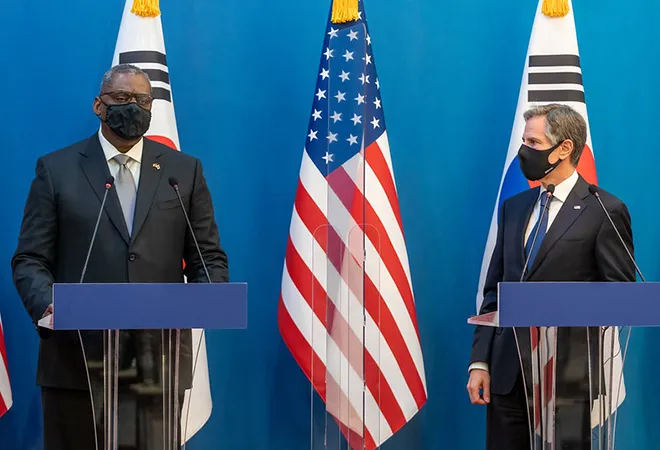-
CENTRES
Progammes & Centres
Location
Ahead of Biden officials’ first meeting with Chinese envoys in Alaska, high-level visits to Japan and South Korea underscored the US’ representation of a united front.

Earlier this week, US Secretary of State Antony Blinken and Defence Secretary Lloyd Austin concluded their first US-Japan 2+2 meeting with Foreign Minister Toshimitsu Motegi and Defence Minister Nobuo Kishi. As part of their first overseas trip, Blinken and Austin also stopped in Seoul for their first US-South Korea 2+2 dialogue with Foreign Minister Chung Eui-yong and Defence Minister Suh Wook. Both sets of high-level meetings encompassed discussions on common challenges posed by the coronavirus pandemic, North Korea’s nuclear programme, the military coup in Myanmar, and climate change. On convergent interests, both meetings included strong endorsements of a “Free and Open Indo-Pacific,” in an evident affront to Chinese behaviour in the region.
This American outreach to its critical allies in East Asia, followed the first-ever QUAD leaders’ summit earlier this month, which reflected considerable momentum and common intent to serve the aims of a ‘Free and Open Indo-Pacific.’ Another sign of the Biden administration conveying US resolve towards the Indo-Pacific is the fact that the outreach to East Asia has been followed up with Austin currently visiting India.
This flurry of US diplomatic activity honed significance from the standpoint of the first-ever dialogue between American and Chinese officials, which were scheduled for 18–19 March in Anchorage, Alaska.
At the US-Japan meeting, the two sides principally focused on China on account of its challenge to the global order and the security environment in the Indo-Pacific. Recent security concerns have been of paramount importance to Japan, in view of Chinese behaviour even amidst the ongoing pandemic. For instance, tensions have flared over the contested Senkaku islands, in view of China enacting a new legislation which permits its coast guard “to use weapons against foreign ships.”
The choice of Japan as the first overseas destination of Blinken and Lloyd’s visit to the region came as no surprise as the Biden administration seeks to shore up US alliances after four years of the Donald Trump administration’s ‘America First’ abhorrence for security commitments.
Ahead of the recent meeting, Washington and Tokyo held regular high-level virtual and telephonic talks to discuss such security issues and possible responses towards unilateral actions taken by China to alter the regional status quo. Furthermore, the choice of Japan as the first overseas destination of Blinken and Lloyd’s visit to the region came as no surprise as the Biden administration seeks to shore up US alliances after four years of the Donald Trump administration’s ‘America First’ abhorrence for security commitments.
In Seoul, the two sides committed to a mutually reinforcing and future-oriented cooperation across sectors and issues like trade, pandemic relief, economic recovery, space, and cyber security, and most critically, action towards pursuing the denuclearisation of North Korea. As in Tokyo, regional security featured markedly at the US-South Korea Foreign and Defence Ministerial, with both sides reiterating their commitment towards the US-ROK bilateral defence partnership, and working towards strengthening combined deterrence and joint-readiness.
The US outreach to Seoul was significant also with respect to South Korea engaging in a delicate balancing act of its relations with Washington and Beijing — which is its largest trading partner. As a result, the recent dialogue’s focus on regional challenges was coupled with the US seeking to underscore converges with Republic of Korea (ROK) towards a common understanding on issues pertaining to China. Thus, starting with a reaffirmation of the US-ROK security alliance, Seoul and Washington made some progress in navigating the complex nuances of the former’s New Southern Policy and the latter’s Indo-Pacific strategy.
The US outreach to Seoul was significant also with respect to South Korea engaging in a delicate balancing act of its relations with Washington and Beijing — which is its largest trading partner.
The visits to Japan and South Korea were critical also from the standpoint of the US reclaiming its traditional role of fostering better relations between Tokyo and Seoul, especially after the Trump years witnessed the deterioration of relations between the two critical US allies.
These engagements with Japan and South Korea were followed by the much-anticipated US-China meeting in Alaska, between Secretary Blinken, US National Security Adviser Jake Sullivan, and Chinese Director of the Office of the Central Commission for Foreign Affairs Yang Jiechi and Foreign Minister Wang Yi.
Videos of the opening session showcased “an unusually undiplomatic sparring match.” While the tenor of both sides seemed to deviate from diplomatic etiquette, it was expected that tempers would flare since this was the first high-level US-China interaction under Biden. With the US side raising a range of outstanding issues — from Chinese human rights abuses in Xinjiang, coercion and intimidation of Hong Kong and Taiwan, Chinese cyberattacks on the US, and differences over Chinese trade practices — the massive trust deficit accrued by the US-China relationship was apparent.
However, from the standpoint of the Biden administration putting forth its baseline positions, the meeting was indicative of Washington defining its priorities. Hence, ahead of the meeting, Blinken deemed it to be “a one-off session” to “lay out, in very frank terms, the many concerns that we have.”
At the Alaska meeting, concerns over China’s domestic and regional behaviour were put forth in the context of Blinken and Lloyd’s recent visit to East Asia.
The US side’s particular focus on human rights was indicative of the Biden administration not only elevating the role of upholding democratic values in US foreign policy, but also not requiring Congressional prodding (as the Trump administration did) on raising American apprehensions over China’s civil liberties record. Ahead of the meeting, the State Department even announced that it would sanction 24 Chinese officials, for their involvement in eroding Hong Kong’s electoral system. Furthermore, Blinken’s comments at the Alaska meeting stood in line with his testimony at a hearing by the House Foreign Affairs Committee (HFAC) earlier this month. The US Secretary of State notably indicated continuity with the Trump administration’s designation of Chinese actions in Xinjiang as genocide against Uyghurs, and the US not shying from interlinking economic ties with US apprehensions over Chinese human rights violations. The latter pertained to the Trump State Department’s advisories that warned US businesses against contributing to Beijing’s human rights abuses, and identifying Chinese entities that use “forced labour and other abusive labour conditions.”
Most importantly, at the Alaska meeting, such concerns over China’s domestic and regional behaviour were put forth in the context of Blinken and Lloyd’s recent visit to East Asia.
In his opening remarks, Blinken stated that Japan and South Korea were “very interested in the discussions that we’ll have here today and tomorrow because the issues that we’ll raise are relevant not only to China and the United States, but to others across the region and indeed around the world.” This effectively put the Chinese envoys on the defensive, over supposedly being unaware of region-wide concerns over China’s behaviour.
The US side’s particular focus on human rights was indicative of the Biden administration not only elevating the role of upholding democratic values in US foreign policy, but also not requiring Congressional prodding (as the Trump administration did) on raising American apprehensions over China’s civil liberties record.
For instance, as China’s current foreign minister and owing to his previous stint as ambassador to Tokyo, Wang Yi has been Beijing’s point person on managing divergences with Japan in a bilateral manner — without permitting American advocacy on behalf of Tokyo. Ahead of the Alaska meeting, however, the US-Japan 2+2 joint statement notably singled out China and underscored common understanding of China’s behaviour being “inconsistent with the existing international order,” and presenting “political, economic, military, and technological challenges to the Alliance and to the international community.”
At the Alaska meeting, this left Yang and Wang to indirectly assert China’s ability to handle issues with regional countries on account of its deep economic ties (Japan and South Korea “are China's second- and the third-largest trading partners”), and complain over the US representing others — “We don’t know if this is a direct complaint coming from those countries that you visited, or is it just the United States’ own view?… So, to accuse China of coercion even before sharing the relevant views with China, is this the right act to do? Of course not.”
This turn of events once again stood in line with the strategy Blinken committed to at the HFAC hearing. Underscoring the criticality of US allies, Blinken had been committed to having China hear “not just our opprobrium, but a chorus of opprobrium from around the world.”
Hence, at the Alaska meeting, bolstered by the reaffirmation of America’s ties with its East Asian allies, Biden officials effectively took control of the narrative on China’s region-wide transgressions.
The views expressed above belong to the author(s). ORF research and analyses now available on Telegram! Click here to access our curated content — blogs, longforms and interviews.

Pratnashree Basu is an Associate Fellow with the Strategic Studies Programme. She covers the Indo-Pacific region, with a focus on Japan’s role in the region. ...
Read More +
Kashish Parpiani is Senior Manager (Chairman’s Office), Reliance Industries Limited (RIL). He is a former Fellow, ORF, Mumbai. ...
Read More +